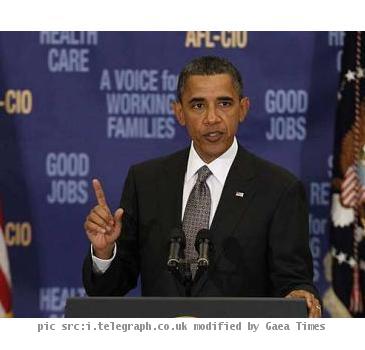Senate expected to pass long-delayed small business lending bill, handing Obama modest win
By APThursday, September 16, 2010
Senate to pass small business lending bill
WASHINGTON — Long-delayed legislation designed to open up credit to small businesses and award them with other incentives to expand and hire new workers is on track to pass the Senate on Thursday.
Passage of the measure, which blends a $30 billion government fund to help open up lending for credit-starved small businesses with bipartisan tax provisions, would give President Barack Obama and his besieged Democratic allies in Congress a much-sought — but relatively modest — political victory with less than seven weeks to go before Election Day.
“At a time when small business owners are still struggling to make payroll and they’re still holding off hiring, we put together a plan that would give them some tax relief and make it easier for them to take out loans,” Obama said Wednesday.
The new loan fund would be available to community banks to encourage lending to small businesses, and supporters say banks should be able to use the fund to leverage up to $300 billion in loans.
The loan fund is opposed, however, by most Republicans, who liken it to the 2008 bailout of the financial system. They warn it would encourage banks to make loans to borrowers who aren’t good credit risks.
Democrats say the measure is needed to help small businesses cope with a credit crunch that worsened dramatically after the financial crisis two years ago.
This legislation would also aid lending by lowering Small Business Administration loan program fees and raising loan guarantee and lending limits.
“This small business jobs bill would give small businesses $12 billion in tax cuts. It would increase small business lending. It would help small business owners to get private capital to finance expansion and hire new workers,” said Senate Finance Committee Chairman Max Baucus, D-Mont. “And all these things would help small businesses to create as many as a half a million jobs.”
The measure had been delayed for months and was successfully filibustered by Republicans in July. But on Tuesday, Democrats cracked the filibuster with the help of two Republicans, Sens. George Voinovich of Ohio and George LeMieux of Florida. That set the stage for Thursday’s vote.
After Senate passage, the bill would return the measure to the House, which is likely to approve it for Obama’s signature.
The bill is advancing too late to help make a dent before Election Day in a 9.6 percent nationwide unemployment rate. It follows successful efforts this year to provide a temporary payroll tax holiday to companies that hire the jobless, and to extend assistance to the unemployed, cash-starved state governments and local school districts.
Democrats had hoped to pass the bill in July but couldn’t win any GOP converts. They fell just short of defeating a filibuster that was called because Democrats blocked Republicans from offering unrelated amendments.
“There are many good things in this bill, but I believe it could have been better,” said Sen. Charles Grassley, R-Iowa. “Unfortunately, the Democratic leadership has been more interested in scoring political points than actually providing relief to small business.”
Grassley wanted the measure to have additional tax cuts, including a 20 percent tax deduction off their earnings.
The small business tax cuts in the bill include breaks for restaurant owners and retailers who remodel their stores or build new ones. Long-term investors in some small businesses would be exempt from paying capital gains taxes.
But in the near term, the bulk of the tax cuts would actually go to big companies to allow them to more quickly recover the costs of capital improvements through depreciation.
The measure also would allow small business owners to deduct the costs of health insurance for themselves and their families from self-employment taxes, but only for the 2010 tax year.
Much of the bill would be paid for by allowing taxpayers to convert 401(k) and government retirement accounts into Roth accounts, in which they pay taxes up front on the money they contribute, enabling them to withdraw it tax-free after they retire.
Tags: Barack Obama, Business And Professional Services, Events, Filibusters, General Elections, North America, Political Organizations, Political Parties, Small Business, Small Business Financing, United States, United States General Election, Washington






